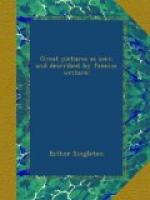He does not altogether take the view of the Heathen which you would get in an Exeter Hall meeting. Does not expatiate on their ignorance, their blackness, or their nakedness. Does not at all think of the Florentine Islington and Pentonville, as inhabited by persons in every respect superior to the Kings of the East; nor does he imagine every other religion but his own to be log-worship. Probably the people who really worship logs—whether in Persia or Pentonville—will be left to worship logs to their hearts’ content, thinks Giotto. But to those who worship God, and who have obeyed the laws of heaven written in their hearts, and numbered the stars of it visible to them,—to these, a nearer star may rise; and a higher God be revealed.
You are to note, therefore, that Giotto’s Soldan is the type of all noblest religion and law, in countries where the name of Christ has not been preached. There was no doubt what king or people should be chosen: the country of the three Magi had already been indicated by the miracle of Bethlehem; and the religion and morality of Zoroaster were the purest, and in spirit the oldest, in the heathen world. Therefore, when Dante in the nineteenth and twentieth books of the Paradise, gives his final interpretation of the law of human and divine justice in relation to the gospel of Christ—the lower and enslaved body of the heathen being represented by St. Philip’s convert ("Christians like these the Ethiop shall condemn")—the noblest state of heathenism is at once chosen, as by Giotto: “What may the Persians say unto your kings?” Compare also Milton,—
“At
the Soldan’s chair,
Defied the best of Paynim chivalry.”
Mornings in Florence (Sunnyside, Orpington, Kent, 1875).
FOOTNOTES:
[21] The floor has been repainted; but though its grey is now heavy and cold, it cannot kill the splendour of the rest.
[22] Fors Clavigera for September, 1874.
LILITH
(ROSSETTI)
ALGERNON CHARLES SWINBURNE
“Of Adam’s first wife, Lilith,
it is told
(The witch he loved before
the gift of Eve),
That, ere the snake’s
her sweet tongue could deceive,
And her enchanted hair was the first gold.
And still she sits, young while the earth
is old,
And, subtly by herself contemplative,
Draws men to watch the bright
net she can weave,
Till heart and body and life are in its
hold.
“The rose and poppy are her flowers;
for where
Is he not found, O Lilith,
whom shed scent
And soft-shed kisses and soft-shed sleep
shall snare?
Lo! as that youth’s
eyes burned at thine, so went
Thy spell through him, and
left his straight neck bent
And round his heart one strangling golden
hair.”
Dante
Gabriel Rossetti.




